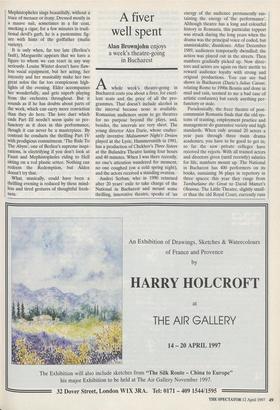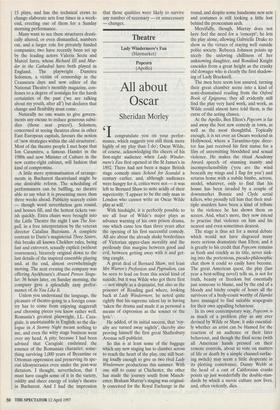A fiver well spent
Alan Brownjohn enjoys a week's theatre-going in Bucharest Awhole week's theatre-going in Bucharest costs you about a fiver, for excel- lent seats and the price of all the pro- grammes. That doesn't include alcohol in the interval because none is available. Romanian audiences seem to go theatres for no purpose beyond the plays, and, besides, the intervals are very short. The young director Alex Darie, whose exuber- antly inventive Midsummer Night's Dream played at the Lyric, Hammersmith in 1991, has a production of Chekhov's Three Sisters at the Bulandra Theatre lasting four hours and 40 minutes. When I was there recently, no one's attention wandered for moment, no one coughed (on a cold spring night), and the actors received a standing ovation.
Andrei Serban, who in 1990 returned after 20 years' exile to take charge of the National in Bucharest and mount some thrilling, innovative theatre, speaks of 'an energy of the audience permanently sus- taining the energy of the performance'. Although theatre has a long and colourful history in Romania, this particular rapport was struck during the long years when the drama was the principal voice of coded, but unmistakable, dissidence. After December 1989, audiences temporarily dwindled; the action was played out in the streets. Then numbers gradually picked up. Now direc- tors and actors are again on their mettle to reward audience loyalty with strong and original productions. You can see bad shows in Bucharest (Dane's Julius Caesar, relating Rome to 1990s Bosnia and done in mud and rain, seemed to me a bad case of artistic confusion) but rarely anything per- functory or stale.
Paradoxically, the freer theatre of post- communist Romania finds that the old sys- tems of training, employment practice and management do guarantee variety and high standards. When only around 20 actors a year pass through three main drama academies, you have to be good to get in; so far the new private colleges have received the rejects. With all trained actors and directors given (until recently) salaries for life, numbers mount up. The National in Bucharest has 400 performers on its books, sustaining 36 plays in repertory in three spaces; this year they range from Tamburlaine the Great to David Mamet's Oleanna. The Little Theatre, slightly small- er than the old Royal Court, currently runs 15 plays, and has the technical crews to change elaborate sets four times in a week- end, erecting one of them for a Sunday morning performance.
Many want to see these structures drasti- cally altered, or even dismantled, numbers cut, and a larger role for privately funded companies; two have recently been set up by the leading actors Valeria Seciu and Marcel lures, whose Richard III and Mur- der in the Cathedral have both played in England. The playwright Dutnitru Solomon, a victim of censorship in the Ceausescu days and now editor of the National Theatre's monthly magazine, con- fesses to a degree of nostalgia for the harsh certainties of the past ('we are talking about my youth, after all') but declares that change and flexibility must come.
Naturally no one wants to give govern- ments any excuse to reduce generous subsi- dies (those seat prices!). Solomon, concerned at seeing theatres close in other East European capitals, favours the notion of 'new strategies within the old structures'. Most of the theatre people I met hope that Ion Caramitru, a famous Hamlet in the 1980s and now Minister of Culture in the new centre-right cabinet, will fashion that kind of compromise.
A little more systematisation of arrange- ments in Bucharest theatreland might be one desirable reform. The scheduling of performances can be baffling, no theatre able to say what it is presenting more than three weeks ahead. Publicity scarcely exists — though word nevertheless gets round, and houses fill, and the hottest tickets van- ish quickly. Extra chairs were brought into the Little Theatre the night I saw The Sea- gull, in a free interpretation by the veteran director Catalina Buzoianu. A complete contrast to Darie's magisterial Three Sisters, this breaks all known Chekhov rules, being fast and extrovert, sexually explicit (without coarseness), bizarrely original down to the last details of the inspired ensemble playing and, at the end, almost overwhelmingly moving. The next evening the company was offering Ayckbourn's Absurd Person Singu- lar; 36 hours later, on Sunday morning, the company gave a splendidly zany perfor- mance of As You Like It.
Unless you understand the language, the pleasure of theatre-going in a foreign coun- try has to come from enjoying stagecraft and choosing pieces you know rather well. Romania's greatest playwright, I.L. Cara- giale, is unobtainable in English; so the dia- logue in A Stormy Night meant nothing to me, and even the witty stage business went over my head. A pity; because I had been advised that Caragiale enshrined the essence of the Romanian character, some- thing surviving 1,000 years of Byzantine or Ottoman oppression and preserving its spe- cial idiosyncrasies even under the post-war dictators. I thought, nevertheless, that I must have caught some of it in the variety, oddity and sheer energy of today's theatre in Bucharest. And I had the impression that those qualities were likely to survive any number of necessary — or unnecessary — changes.



































































 Previous page
Previous page